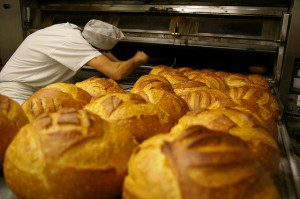So a couple of days ago we recommended the latest issue of Comment on how the faith and work conversation often avoids talking about God’s plan for those of us in work that is blue-collar, no-collar, or just plain icky. They got in touch and were nice enough to let us reprint some excerpts from the magazine here at MISSION:WORK. And, if you want to read more of the stories from the issue, you can still subscribe TODAY by following this link.
I may have pulled my stool a bit close to his workbench, but he did not seem to mind and he didn’t notice. I was in the home of Dave Miller, the pseudo-uncle of bread bakers, as he shaped the loaves for the Saturday market. There were twenty plus years of skill in those hands, and I can still feel the rhythm of it all.
Twenty years of repetitive motion contrasts strongly with the movements of a novice. Starting out as a bread baker is probably more awkward than learning how to skate. And I remember my first loaves as you remember a hard fall. It has been over four years now, twelve hour days, sometimes six days a week, covered in flour and dried out dough, sleeping on flour sacks, and stretching out shoulder aches. Along the way, I have had some teachers who would nail down on me, but the most influential one would walk past me as I mixed a dough, hand me a crust to chew on and say, “Katy, learn to love it.”
At the time, it seemed like an odd thing to say. Especially as the process of learning was not easy to love. Half your days as a bread baker are spent scaling ingredients. Flour, plus water, plus salt. Over and over again—in many forms. During my first six months, I would have to weigh, and reweigh my ingredients, accounting for every gram. Because—believe it or not—five grams of salt can be the difference between a loaf that is alive and a loaf that is dead. This knowledge on its own, was enough to scare the details into me. But, looking back I understand. I was being taught to pay attention.
It was under Michel Suas that I worked harder than I thought possible. He showed me that love for the end product was not enough to make great bread. To love what you do—you need to get to know what you do, you need to practice the process.
What has been most important in learning how to make bread is the willingness to care enough to persevere. To wake up each day and try to be sensitive to something as seemingly innocuous as the temperature outside. You have to be disciplined and focused enough in order to control all the variables; to get the timing and temperature right; to master the dough, before it masters you.
There are a lot of lessons to be learned baking bread. And these are things that I hope I can express in my daily life. I certainly fall short quite a bit, and of course I cannot always make perfect bread. But that is part of it, the striving, is what is important.
—Katrina VandenBerg, Journeywoman Baker
Reprinted from Comment’s website. Read lots more stuff like this by clicking on over. And you can read more about this conversation in these posts on MISSION:WORK, too:
- What does faith and work mean to blue-collar workers?
- “Is this not Joseph’s son, the blue-collar worker?”
- Does blue-collar work have any meaning?
- Unfulfilling work as vocation
- Which is a higher calling: building churches or building fences?
- The craftsman and her environment
- Greed is just another word for fear












